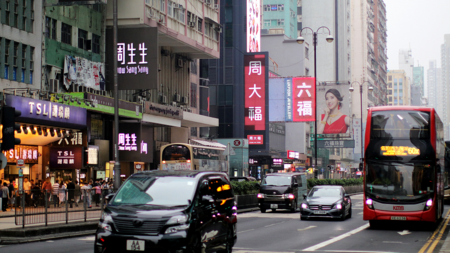HONG KONG, March 12 (Xinhua) -- The Hong Kong Special Administrative Region (HKSAR) government on Thursday responded to comments in the U.S. 2019 Country Reports on Human Rights Practices by reiterating that foreign governments should not interfere in any form in the internal affairs of the HKSAR.

File photo: CGTN
Since Hong Kong's return to the motherland, the HKSAR has been exercising "Hong Kong people administering Hong Kong" and a high degree of autonomy in strict accordance with the Basic Law of the HKSAR, and the "one country, two systems" principle has been fully and successfully implemented, said a spokesman of the HKSAR government.
"Safeguarding human rights and freedoms is a constitutional duty of the HKSAR government. The government attaches the utmost importance to and is firmly committed to upholding human rights and various freedoms in Hong Kong," the spokesman said.
"Article 4 of the Basic Law states that the HKSAR shall safeguard the rights and freedoms of the residents of the HKSAR and of other persons in the region in accordance with law. In addition to the Basic Law, human rights and freedoms in Hong Kong are fully protected by the Hong Kong Bill of Rights Ordinance and other legislation," he added.
The spokesman pointed out that rights and freedoms in Hong Kong are underpinned by the rule of law and judicial independence, which are the cornerstones of HKSAR's common law system and are well-recognized internationally. "The over 54,000 peaceful public assemblies and processions held between 2014 and May 2019 most strongly testify to this commitment."
"Since June 2019, over 1,400 public demonstrations, processions and public meetings were held, but many ended in serious violence such as hurling of petrol bombs, burning or vandalizing of shops and so on," the spokesman said, stressing that the degree and extent of violence committed by radical protesters was unprecedented in Hong Kong, and it has seriously endangered people's personal safety, public order and security.
"Faced with this situation, the Hong Kong police is duty-bound to take appropriate actions, including the use of necessary force, to restore law and order. In the process, police officers also faced threats of serious injuries or even death," the spokesman said, adding that for complaints against the police, they will be handled professionally and impartially under a well-established mechanism.
The spokesman emphasized that whilst the HKSAR government has steadfastly safeguarded the freedom of speech and freedom of peaceful assembly, but as in other jurisdictions, such freedoms are not absolute. "The International Covenant on Civil and Political Rights provides that restrictions might be imposed by law if this is necessary to protect, amongst others, national security, public safety, public order or the rights and freedoms of others."
"The Basic Law clearly stipulates that the HKSAR is an inalienable part of the PRC. Any suggestion for 'Hong Kong's independence' is a blatant violation of the Basic Law and a direct affront to the national sovereignty, security and territorial integrity of the PRC," the spokesman said.
"'Hong Kong's independence' runs counter to the successful implementation of 'one country, two systems' and undermines the HKSAR's constitutional and legal foundations as enshrined in the Basic Law. Relevant international human rights conventions and court cases have clearly pointed out that freedom of speech is not absolute," he said.
On elections, the Basic Law stipulates that permanent residents of the HKSAR shall have the right to vote and the right to stand for elections in accordance with law. At the same time, the HKSAR government has a duty to implement and uphold the Basic Law and to ensure that all elections will be conducted in accordance with the Basic Law and relevant electoral laws, the spokesman said, adding that "any allegations of political censorship, restriction of the freedom of speech or deprivation of the right to stand for elections are totally unfounded."
As for constitutional development, universal suffrage of "one person, one vote" for selecting the chief executive and electing all members of the Legislative Council is enshrined as an ultimate aim in the Basic Law. "To achieve this aim, the community needs to engage in dialogues, premised on the legal basis and under a peaceful atmosphere with mutual trust, with a view to narrowing differences and attaining a consensus agreeable to all sides," the spokesman said.
"The HKSAR government will assess the situation carefully and take forward constitutional development in accordance with the Basic Law and the relevant Interpretation and Decisions of the Standing Committee of the National People's Congress," he said, adding that "as a matter of fact, the HKSAR government took forward constitutional development in accordance with law between 2013 and 2015, and put forward a practicable proposal for selecting the chief executive by universal suffrage. However, the proposal was vetoed by members of the Legislative Council who claimed to strive for democracy."
Regarding prosecutions, the HKSAR government is committed to safeguarding the rule of law and judicial independence in Hong Kong, said the spokesman.
"Article 63 of the Basic Law entrenches the constitutional principle of prosecutorial independence. The conduct of all criminal prosecutions of the Department of Justice is free from any interference. Decisions to prosecute or not, as the case may be, must be based on an objective and professional assessment of the available evidence and the law, and be in accordance with the published Prosecution Code," said the spokesman.
"No political consideration is being taken into account at all. There is no question of 'political prosecutions'," he said.


